Guava Nutrition Facts
Guava Nutrition Facts and Health Benefits
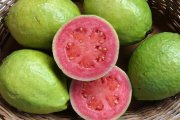 Guavas are native to Central and South America as well as to Mexico. However, today you may find them across the globe, from Asia to Africa to Australia. Guavas are considered to be super fruits. This is because they are a source of Calcium, Iron, Vitamin E, Vitamin K, Thiamin, Riboflavin, Niacin, Vitamin B6, Pantothenic Acid, Magnesium, Phosphorus, Zinc and Selenium.They are also a good source of Vitamin A, Potassium, Copper and Manganese. Finally, they are an excellent source of Dietary Fiber and Vitamin C.
Guavas are native to Central and South America as well as to Mexico. However, today you may find them across the globe, from Asia to Africa to Australia. Guavas are considered to be super fruits. This is because they are a source of Calcium, Iron, Vitamin E, Vitamin K, Thiamin, Riboflavin, Niacin, Vitamin B6, Pantothenic Acid, Magnesium, Phosphorus, Zinc and Selenium.They are also a good source of Vitamin A, Potassium, Copper and Manganese. Finally, they are an excellent source of Dietary Fiber and Vitamin C.
In fact, it has been found out that just one guava contains four to five times the amount of Vitamin C as oranges and most citrus fruits. You can have a guava in various forms including raw, ripe, semi-ripe, dried, juice, jelly, jam, paste or pastry just to mention a few examples. The juice form of guavas is mostly popular in South Africa, Egypt, Hawaii, Mexico, Colombia, Puerto Rico and Venezuela. Due to their high levels of the soluble fiber pectin, guavas are used extensively to make preserves, marmalade and candies.
So why should guavas be added in any eating healthy diet? What are the health benefits we get from consuming them? For one, they have a high antioxidant content. This in itself has several benefits. Antioxidants aid in giving us a healthy and firm skin texture, fighting against free radicals that cause aging. They also help in preventing lowered immunity as well as some cancers just to name a few. Guavas also contain lycopene which is the other thing that aids them in preventing cancers. Research on guavas and their nutrition facts have found that guavas also help in the treatment of scurvy, dysentery, diarrhea, coughs, colds and hypertension. They have also been found to aid in weight loss, so if you are on that journey, you may add these in your eating plan, together with strawberries and bananas.
The other thing that has guavas going on for them is their Dietary Fiber content. They are a good source of dietary fiber. Therefore, not only do they aid in digestion, but they also clean out the intestines, thereby reducing the risk of colon cancer. In fact, potassium and carotenoids present in guavas also aid in disinfecting, strengthening and toning up our digestive system. Dietary Fiber also lowers high blood pressure. This it does by lowering the LDL "bad" cholesterol levels in our blood. When the "bad" cholesterol is reduced it obviously means the "good" cholesterol is being increased in the blood stream.
Finally, if there's anything you should remember about guavas, remember this: they are an excellent source of Vitamin C. As we have mentioned earlier, guava nutrition facts show that just one guava contains four to five times the amount of Vitamin C as an orange. And most of us off the top of our heads know that oranges are known to be the powerhouse of vitamin C. So this comes as a surprise huh? Vitamin C is the only cure for scurvy, this is why guavas are said to help prevent scurvy. Vitamin C as we know also boosts our immune system and helps our bodies to fight against viral and bacterial infections that may want to attack our system.
Guava Nutrition Facts
These are the nutrition facts of the common guava, raw. As we have mentioned earlier, they show us that guavas are especially an excellent source of Vitamin C. They provide you with 628% of your daily value.
- Serving size- 165g
- Calories- 112
- Calories from Fat- 13
- Total Fat- 2g, 2% of DV
- Saturated Fat- 2% of DV
- Cholesterol- 0mg
- Sodium- 3mg, 0% of DV
- Total Carbohydrate- 24g, 8% of DV
- Dietary Fiber- 9g, 36% of DV
- Sugars- 15g
- Protein- 4g
- Vitamin A- 21% of DV
- Vitamin C- 628% of DV
- Calcium- 3% of DV
- Iron- 2% of DV
- Vitamin E- 6% of DV
- Vitamin K- 5% of DV
- Thiamin- 7% of DV
- Riboflavin- 4% of DV
- Niacin- 9% of DV
- Vitamin B6- 9% of DV
- Folate- 20% of DV
- Pantothenic Acid- 7% of DV
- Magnesium- 9% of DV
- Phosphorus- 7% of DV
- Potassium- 20% of DV
- Zinc- 3% of DV
- Copper- 19% of DV
- Manganese- 12% of DV
- Selenium- 1% of DV
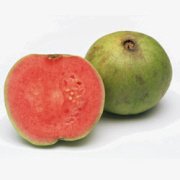
Guava Nutrition Facts: Paste
Guava Paste nutrition facts reveal that it is basically a source of Potassium and Dietary Fiber. It is also a good source of Vitamin C.
- Serving size- 1 medium piece
- Calories- 90
- Calories from Fat- 0
- Total Fat- 0g
- Saturated Fat- 0g
- Cholesterol- 0mg
- Sodium- 0mg
- Potassium- 22mg
- Total Carbohydrate- 23g, 8% of DV
- Dietary Fiber- 0.4g, 2% of DV
- Sugars- 23g
- Protein- 0.03g
- Vitamin A- 0% of DV
- Vitamin C- 23% of DV
- Calcium- 0% of DV <
- Iron- 0% of DV
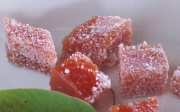
Pineapple Guava Nutrition Facts
Pineapple guava nutrition facts show us that it is low in calories and does not contain any saturated fat, cholesterol and is low in sodium. It is a source of Calcium, Phosphorus, Magnesium, Potassium, Copper, Manganese and some vitamins. The pineapple guava, which is also known as feijoa is a good source of folate and an excellent source of vitamin C.
- Serving size- 100g
- Calories- 49
- Calories from Fat- 7
- Total Fat- 1g, 1% of DV
- Saturated Fat- 0g
- Cholesterol- 0mg
- Sodium- 3mg, 0% of DV
- Total Carbohydrate- 11g, 4% of DV
- Dietary Fiber- 0% of DV
- Protein- 1g
- Vitamin A- 0% of DV
- Vitamin C- 34% of DV
- Calcium- 2% of DV
- Iron- 0% of DV
- Folate- 10% of DV
- Phosphorus- 2% of DV
- Magnesium- 2%% of DV
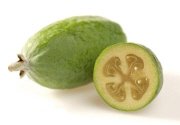
Guava Nutrition Facts: Juice
Guava Juice nutrition facts reveal that it is a source of Manganese, Potassium, Vitamin K, Calcium and Vitamin A. It is also a good source of Dietary Fiber. Once again, the Vitamin C content stands out. This one cup of guava juice provides you with 83% of your recommended daily allowance of Vitamin C, making it an excellent source of the vitamin.
- Serving size- 250ml
- Calories- 143
- Calories from Fat- 1
- Total Fat- 0g
- Saturated Fat- 0g
- Cholesterol- 0mg
- Sodium- 18mg, 1% of DV
- Total Carbohydrate- 37g, 10% of DV
- Dietary Fiber- 3g, 12% of DV
- Sugars- 31g
- Protein- 0g
- Vitamin A- 2% of DV
- Vitamin C- 83% of DV
- Calcium- 3% of DV
- Iron- 0% of DV
- Vitamin K- 3% of DV
- Potassium- 3% of DV
- Manganese- 5% of DV
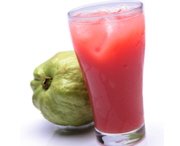
Guava Nutrition Facts: Pastry
Guava pastry nutrition facts show us that it is a source of Calcium, Protein and Dietary Fiber. It is also a good source of Dietary Fiber. However, the calories, total fat, saturated fat and sodium content may be considered to be moderate going towards high.
- Serving size- 1 serving
- Calories- 260
- Calories from Fat- 110
- Total Fat- 13g, 20% of DV
- Saturated Fat- 3g, 15% of DV
- Trans Fat- 0g
- Cholesterol- 0mg
- Sodium- 280mg, 12% of DV
- Total Carbohydrate- 31g, 10% of DV
- Dietary Fiber- 2g, 8% of DV
- Sugars- 1g
- Protein- 4g, 8% of DV
- Vitamin A- 0% of DV
- Vitamin C- 25% of DV
- Calcium- 8% of DV

Pineapple Guava Nutrition Facts: Juice
These are Mistic Pineapple Guava Juice nutrition facts. It once again an excellent source of Vitamin C, providing you with 100% of your daily value. It is also a good source of Vitamin E and Vitamin A. However, it does not contain any dietary fiber and the amount of sugars are very high.
- Serving size- 8fl oz (250ml)
- Servings per container- 2
- Calories- 130
- Calories from Fat- 0
- Total Fat- 0
- Saturated Fat- 0g
- Cholesterol- 0mg
- Sodium- 30mg, 1% of DV
- Total Carbohydrate- 33g, 11% of DV
- Dietary Fiber- 0g
- Sugars- 32g
- Protein- 0g
- Vitamin A- 10% of DV
- Vitamin C- 100% of DV
- Vitamin E- 25% of DV
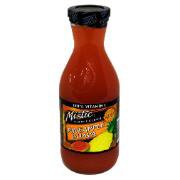
Guava Nutrition Facts: Shells canned in heavy syrup
Nutrition facts on guava shells continue to show the trend of how guavas are an excellent source of Vitamin C. These shells provide you with 337% of your daily value. They are also a good source of Copper, Vitamin B6, Vitamin A, Niacin and Potassium. They are also an excellent source of Dietary Fiber. Another good thing is that they do not contain any cholesterol and are low in fat and sodium content. These canned guava shells are normally used in desserts or can just be eaten like that and still taste good.
- Serving size- 1 cup
- Calories- 300
- Calories from Fat- 12
- Total Fat- 1.3g, 2% of DV
- Saturated Fat- 0.4g, 2% of DV
- Polyunsaturated Fat- 1g
- Monounsaturated Fat- 0.1g
- Cholesterol- 0mg
- Sodium- 9mg, 0% of DV
- Potassium- 564mg, 16% of DV
- Total Carbohydrate- 75g, 25% of DV
- Dietary Fiber- 12g, 48% of DV
- Protein- 2g, 4% of DV
- Vitamin A- 26% of DV
- Vitamin C- 337% of DV
- Calcium- 4% of DV
- Iron- 4% of DV
- Vitamin E- 6% of DV
- Thiamin- 4% of DV
- Riboflavin- 5% of DV
- Niacin- 12% of DV
- Folate- 4% of DV
- Vitamin B6- 14% of DV
- Phosphorus- 6% of DV
- Magnesium- 6% of DV
- Zinc- 4% of DV
- Copper- 11% of DV
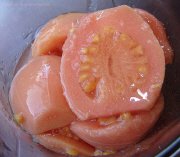
So it is absolutely clear that guavas are one of the best, in fact, excellent sources of Vitamin C, which we know does great things for our bodies that we have discussed above. Who knew that such a small fruit could have such health benefits? If you haven't tried one out, go ahead and try them. It's unfortunate they are seasonal. However, you could still have them as canned shells, they are almost equally as good.


